As a driver, taking care of your vehicle is essential, and one of the most critical components to maintain is brakes. Regular use can make brakes dirty, noisy, and malfunctioning, leading to dangerous driving situations.
One product that many people turn to for general maintenance and cleaning is WD40. However, when using WD40 on brakes, there is often confusion and debate about whether it is safe. We will explore the question of whether you can spray WD40 on brakes.
We will cover the science behind how brakes work, the components of a brake system, and the potential risks and benefits of using WD40 on your brakes. Our goal is to provide you with the information you need to decide whether to use WD40 on your brakes and, if so, how to do it safely and effectively.
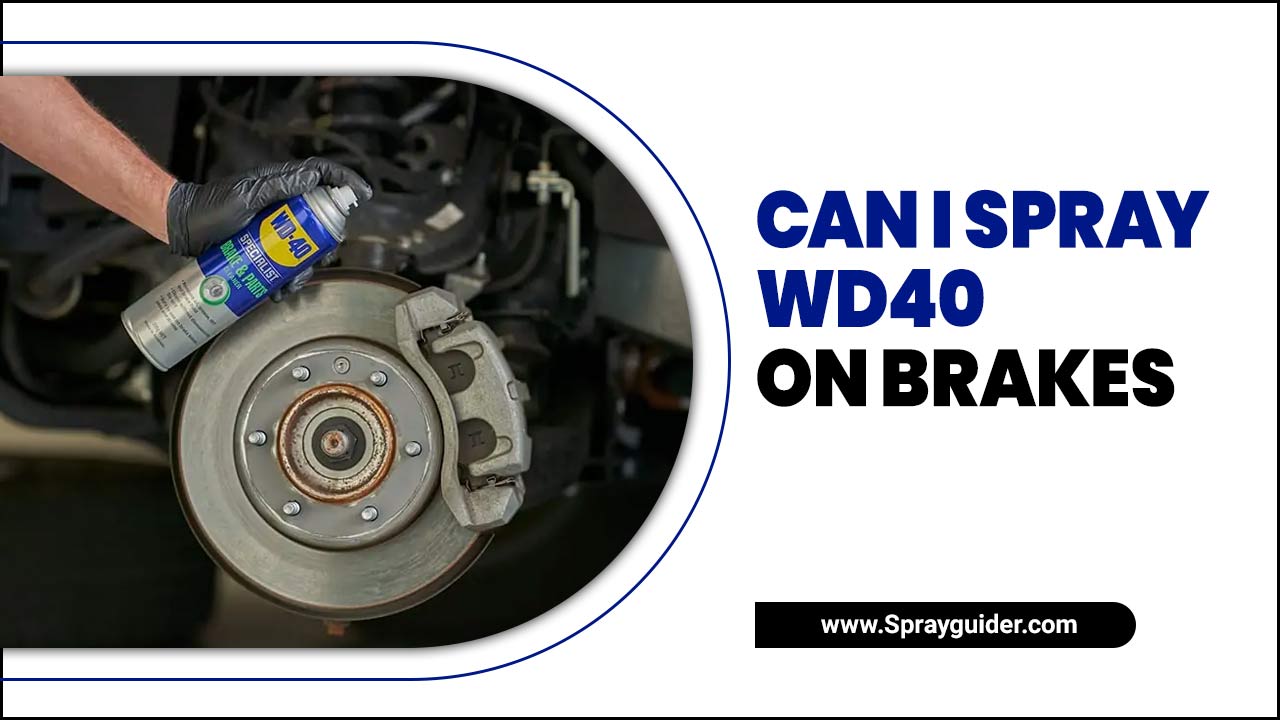
Can I Spray WD40 On Brakes? What You Need To Know
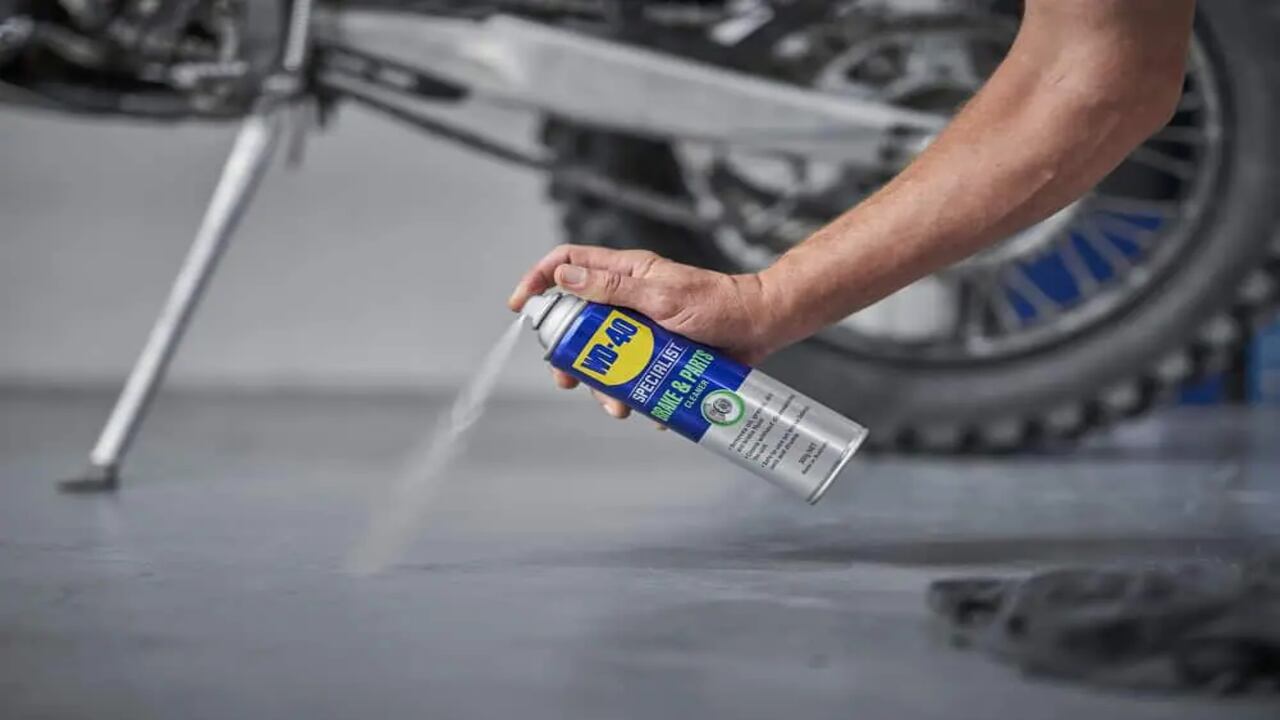
Spraying WD40 on brakes is not recommended and can be dangerous. WD40 is a lubricant designed to penetrate and loosen rusted or stuck parts. While it may seem like a quick fix for squeaky brakes, using WD40 on your brakes can do more harm than good.
The lubricant can cause the brake pads and rotors to become slippery, reducing braking performance and potentially causing accidents. It is best to leave brake maintenance and repairs to professionals with the knowledge and experience to properly service your vehicle’s braking system.
The Influence Of Lubrication And Moisture
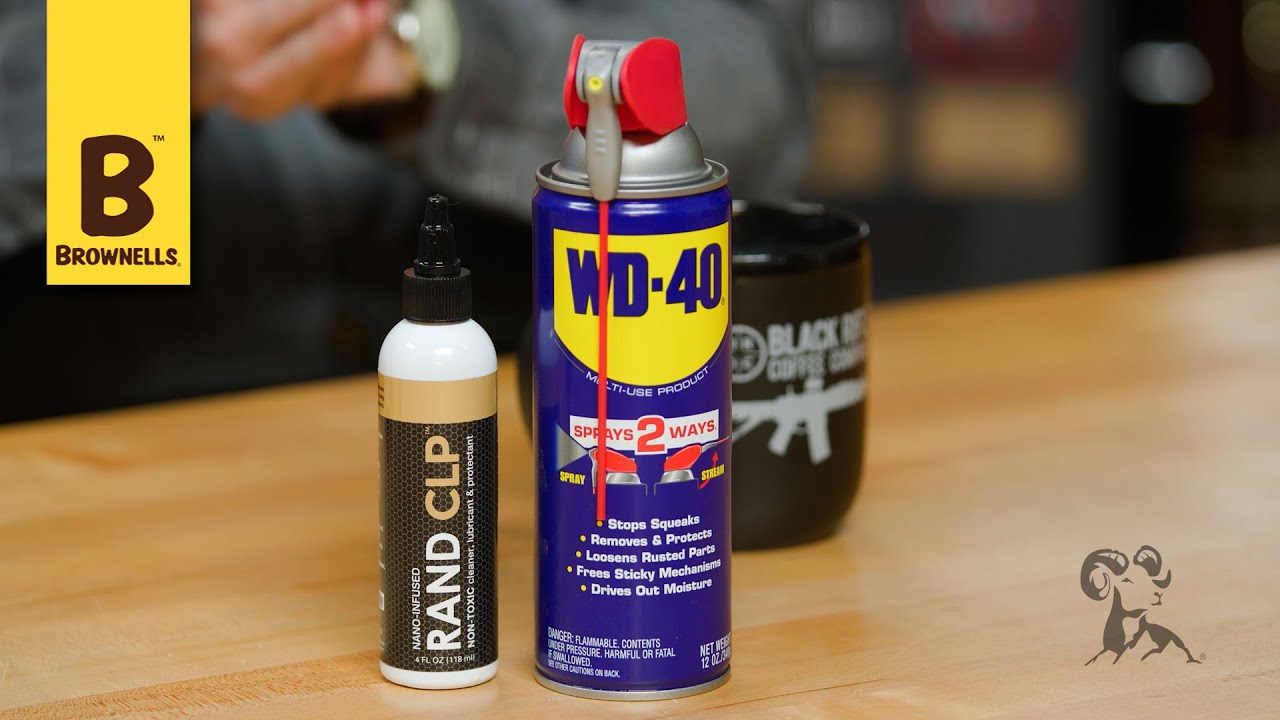
Understanding the impact of lubrication and moisture on brake performance is crucial. Proper lubrication plays a significant role in maintaining effective braking. It ensures smooth movement of the system parts, such as the piston, piston bore, and piston seal. Without adequate lubrication, friction and unsmooth movement can result in potential damage to the brake calliper and other components.
On the other hand, moisture can have adverse effects on your braking system. If not addressed promptly, it can lead to corrosion, leaks, and even piston seizure. Moisture can accumulate in the brake system due to dew, washing the car brakes with hot water, or exposure to humid conditions. To minimize the influence of moisture, choosing appropriate lubricants that can withstand dampness and provide optimal performance is essential. Regular maintenance, including cleaning the contact points and removing any grime or gunk using a solvent or detergent with warm water, can help prolong brake efficiency.
The Role Of Rusty Rotors And Brake Pad Wear
Rusty rotors can harm your braking performance, potentially compromising your safety on the road. It’s essential to address rusty rotors promptly to maintain optimal braking power. Regularly checking for brake pad wear ensures safe and effective stopping. When brake pads wear down, they become less effective at generating friction and stopping your vehicle efficiently. This can increase your stopping distance and pose a risk in emergencies.
Understanding the impact of rusty rotors and worn brake pads on your braking system is essential for proactive maintenance. You can ensure your braking system operates at its best by addressing rotor rust and replacing worn brake pads. Regular inspections and timely maintenance should be prioritized to prevent further damage and maintain a safe ride.
The Implication Of Spraying WD40 On Brakes
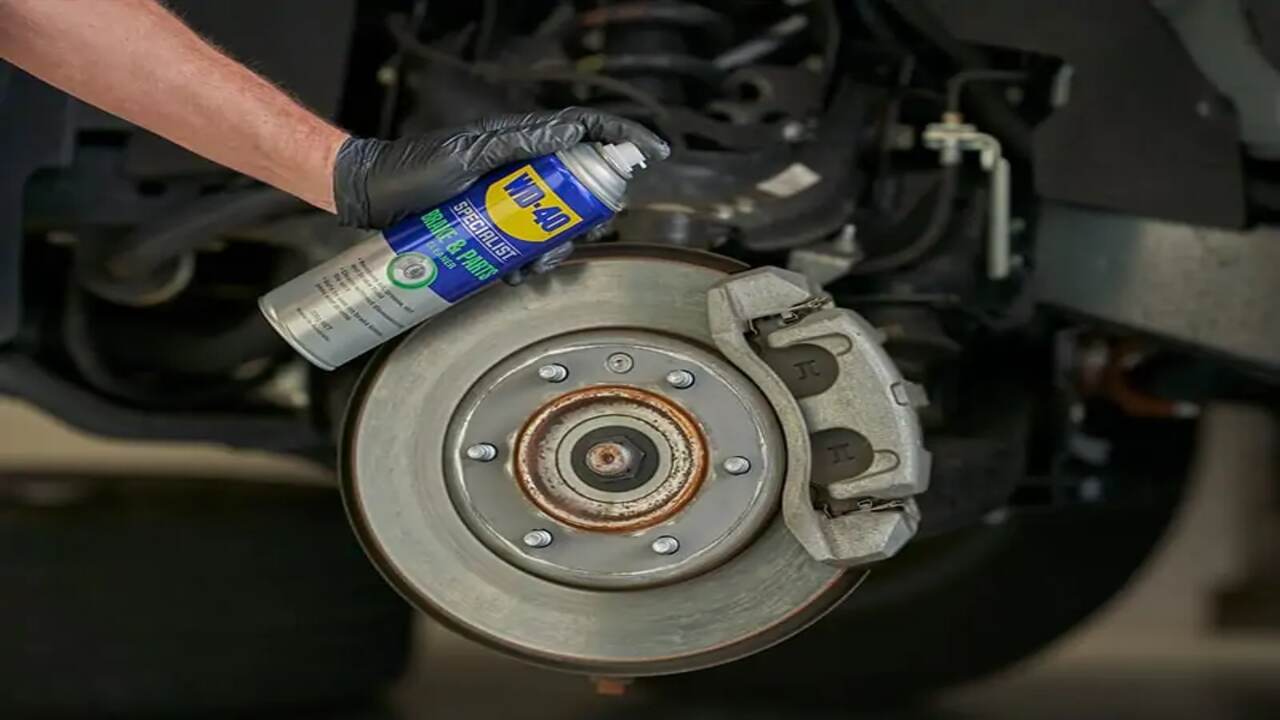
When spraying WD40 on your brakes, it’s crucial to exercise caution to avoid potential risks. Understanding the impact of WD40 on your vehicle’s braking system is essential in making an informed decision.
While WD40 may seem like a convenient solution for lubrication, it can cause harm to your brake performance. It’s important to consider alternative lubricants for your brakes instead of relying solely on WD40.
Exploring options such as brake cleaner, grease, and degreasers can provide adequate lubrication without compromising your brake’s functionality. Solvents like WD40 can lead to corrosion, leaks, and other issues in vital brake system parts such as brake rotors, pistons, and cylinders. Therefore, it’s best to err on caution and avoid spraying WD40 on your brakes.
Potential Risks To Brake Performance And Calipers
Using WD40 on your brakes can have detrimental effects on their performance. Spraying WD40 on the callipers specifically can lead to a decrease in braking efficiency. It’s important to avoid using WD40 altogether to prevent potential damage to the callipers and protect the overall functionality of your brake system.
By refraining from using WD40 on your callipers, you ensure safe braking and maintain the integrity of your brake system. The solvents in WD40 can interact with the brake components, causing corrosion and leaks.
It’s best to rely on alternative lubricants or cleaning methods, such as brake cleaner, grease, or degreasers, to keep your brakes in optimal condition. Remember to prioritize regularly maintaining your brakes to avoid severe damage and ensure a smoother and safer ride.
The Impact On Brake Pads
Spraying WD40 on your brakes can significantly impact the performance of your brake pads. One of the main concerns is that WD40 can contaminate the brake pads, reducing their effectiveness.
This contamination can hinder the friction between the brake pads and the rotors, leading to decreased braking power and potentially compromising your safety on the road. To keep your brake pads clean and maintain optimal braking performance, avoiding using WD40 spray on them is essential.
Preserving the friction surface of your brake pads is essential for ensuring proper functionality. Using WD40 on the brake pads can cause the surface to become slick, preventing the necessary grip needed for efficient braking. Instead of using WD40, it is recommended to use appropriate lubricants specifically designed for car brakes. These lubricants are formulated to provide the necessary lubrication without compromising the braking performance.
Avoiding WD40 and choosing suitable lubricants can prevent unnecessary wear and tear on your brake pads. This will help extend the lifespan of your brake pads and save you from potentially costly repairs.
It is essential to prioritize the maintenance and care of your brake system to ensure safe and reliable braking performance. Remember, when it comes to your brake pads, it’s best to avoid WD40 and choose suitable lubricants to keep your brakes in optimal condition.
How Harmful Can WD40 Be For Your Vehicle’s Brakes?
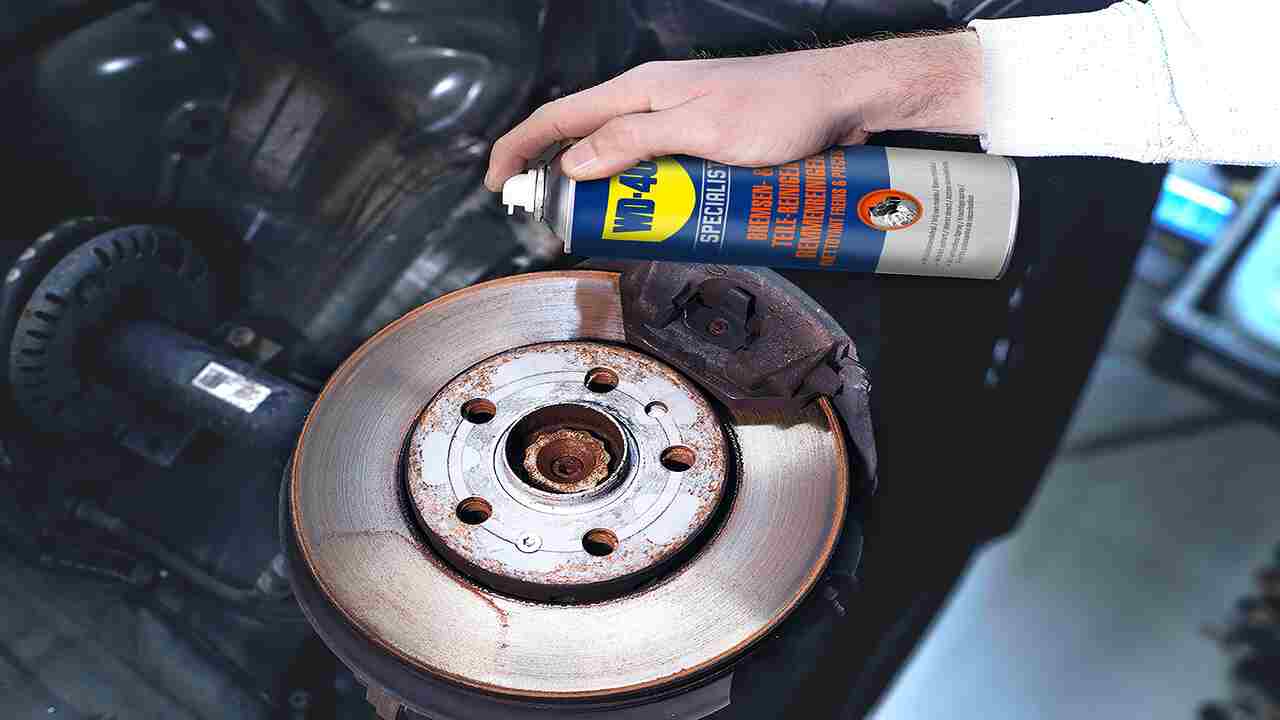
Using WD40 on your vehicle’s brakes can be extremely harmful and is not recommended. WD40 is a lubricant designed to displace moisture and prevent rust, but it is not meant to be used on braking systems.
Brakes require friction between the brake pads and rotors to stop your vehicle effectively, and any type of lubricant, including WD40, can reduce this friction and compromise your braking performance.
It can also contaminate the brake pads and rotors, leading to decreased stopping power and potentially dangerous situations on the road. If you are experiencing brake issues, it is always best to consult a professional mechanic who can properly diagnose and address the problem.
Alternatives To WD40 For Lubricating Brakes
Explore effective alternatives to WD40 for lubricating your brakes. Regarding brake maintenance, several options can provide suitable lubrication without compromising your brake performance. One choice is using brake cleaner, a solvent-based product specifically designed to remove dirt, grime, and contaminants from the contact points of your brake system.
Another option is grease, which helps reduce friction and prevents corrosion on brake parts. Additionally, degreasers can clean brake components and remove any built-up gunk or debris. Choosing lubricants formulated explicitly for brakes is essential to ensure proper lubrication and avoid potential damage.
Remember to follow the manufacturer’s instructions and use the appropriate products for your braking system. By opting for safe and reliable alternatives, you can maintain the integrity of your brake system and enjoy a smoother ride.
Effective Use Of Brake Cleaner, Grease, And Degreasers
To ensure optimal brake performance, it is crucial to use brake cleaner, grease, and degreasers effectively. Brake cleaner is a powerful solvent that helps remove dirt, grime, and corrosion from your brake components. To ensure smooth operation, you can clean the disc rotors, piston bores, and other contact points using a wire brush or steel wool.
After cleaning, applying suitable brake grease to lubricate the piston seals, dust boots, and other metal parts is essential. This ensures the brakes move smoothly and prevents any squealing or unsmooth movement. Also, degreasers can thoroughly clean the callipers and remove accumulated grime or brake dust.
When applying these products, following the manufacturers’ recommended techniques is crucial. This will ensure that the products are used correctly and that your brake system remains in top condition. You can enjoy a safer and smoother ride by properly functioning your brakes with the correct usage of brake cleaner, grease, and degreasers.
How Do I Safely Remove WD40 From My Brakes?
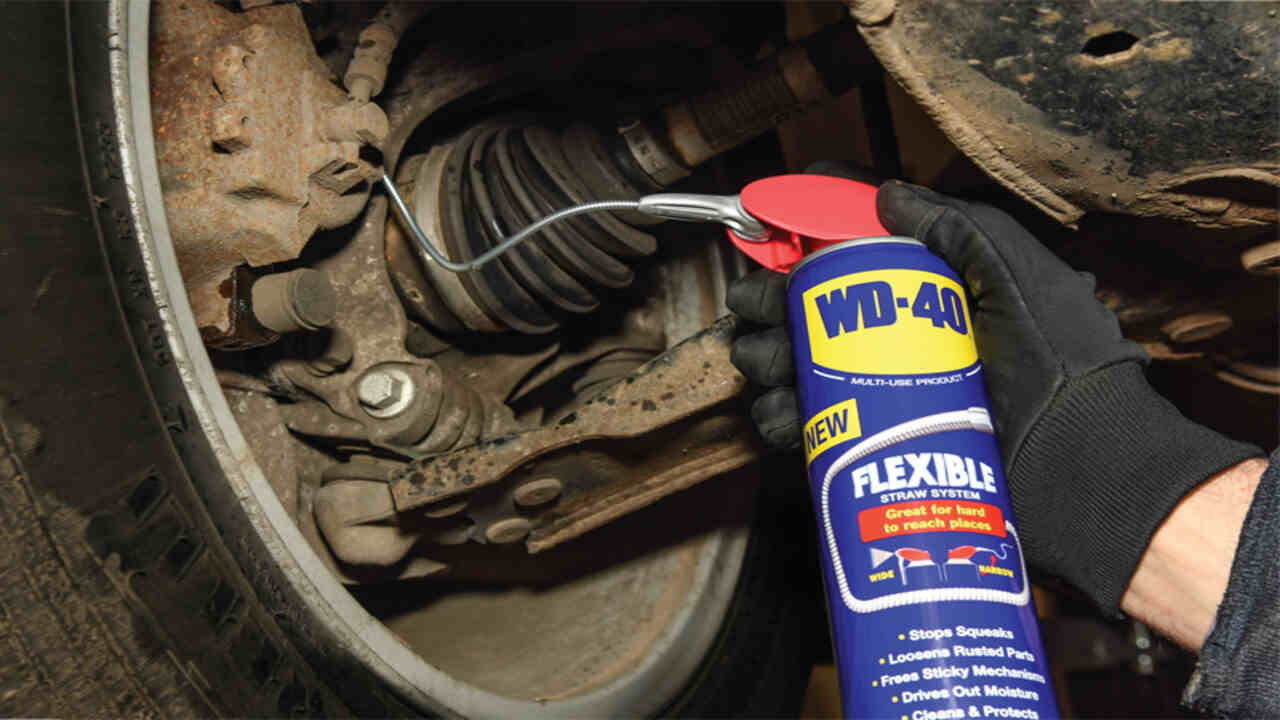
If you have accidentally sprayed WD-40 on your brakes, it is essential to remove it as soon as possible to ensure the safety and effectiveness of your braking system. Remember, prevention is always better than cure.
To avoid accidentally spraying WD-40 on your brakes, take precautions when using the product near your vehicle’s braking system and cover or protect these components if necessary. Here are some steps to safely remove WD-40 from your brakes:
- Lift The Affected Wheel: Use a jack to lift the wheel exposed to WD-40. This will allow you to access the brake components more quickly.
- Clean With Brake Cleaner: Spray a brake cleaner directly onto the affected area, focusing on the rotor and calliper. The brake cleaner will help dissolve and remove any residual WD-40.
- Wipe Off Excess: Use a clean cloth or paper towel to wipe away any remaining WD-40 and brake cleaner from the surface of the brakes. Be thorough in this step to ensure all contaminants are removed.
- Test Your Brakes: After cleaning, lower the vehicle and test your brakes in a safe location. Pay attention to any changes in braking performance or unusual noises. If you notice any issues, it is recommended to consult a professional mechanic for further inspection.
Conclusion
Spraying WD40 on your brakes can severely affect their performance and safety. WD40 is not designed for use on brake systems. It can lead to lubrication issues, reduced braking power, and potential damage to brake components.
It’s essential to prioritize the safety of yourself and others on the road by using the appropriate products for brake maintenance. If you need to lubricate your brakes, consider using brake cleaner, grease, or degreasers formulated explicitly for this purpose.
These products will help ensure proper function and longevity of your braking system without compromising safety. Remember, when it comes to your vehicle’s brakes, always prioritize security and use the right products to maintain peak performance.
Frequently Asked Questions
1.What Can I Spray On My Brakes To Stop Squeaking?
Ans: You can use brake lubricant or an anti-squeal compound to stop brake squeaking. Avoid using oil-based lubricants like WD40, as they can make your brakes slippery and unsafe. Clean the brake components with brake cleaner before applying the oil. If the squeaking persists, have a professional mechanic inspect your brakes.
2.Can I Put WD-40 On Brakes?
Ans: Using WD-40 on brakes is not recommended as it can compromise their effectiveness. WD-40 is a degreaser that can remove the necessary lubrication from brake components. Instead, use brake or brake parts cleaner to clean your brakes, following the manufacturer’s instructions.
3.Can I Spray WD40 On My Brakes To Stop Squeaking?
Ans: Spraying WD40 on your brakes to stop squeaking is not recommended. WD40 is a lubricant that can negatively affect brake performance. Squeaky brakes may be a sign of worn brake pads or other issues that require professional attention. If you experience persistent brake noise, consult a mechanic.
4.What Are The Potential Risks Of Using WD40 On Brakes?
Ans: Using WD40 on brakes can have detrimental effects. Due to its oil-based formula, it can compromise braking performance, increase stopping distance, and contaminate brake pads and rotors. Continued use may lead to costly repairs and damage to the entire braking system. Always opt for brake cleaner specifically designed for cleaning brakes.
5.Is It Safe To Use WD40 On Brakes?
Ans: While it may be tempting to use WD40 on brakes, it is unsafe. This can cause the brake pads to become slick, reducing their effectiveness. Instead, opt for brake cleaners specifically designed to ensure safe and reliable braking performance.
Meet Allen Yu, the Spray Guru behind Spray Guider. With a passion for transforming rides into rolling works of art, Allen Yu specializes in Bike and Car Sprays. Unleash your vehicle’s potential with expert tips and creative inspiration. Elevate your ride with Allen Yu—because every spray tells a story!
